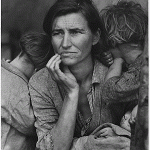Poverty myths
Since ‘rediscovering’ poverty in the 60s, social programs have come and gone with few results. * Yet we are made to feel guilty, no matter how much we spend.
This needs a close look. The irresponsible poor who do not work are featured with their kids in front of a shack despairing. The poor who do work are rarely interviewed, nor are those who have gotten out of poverty.
There are others we don’t hear from – those abused by the irresponsible poor – landlords, merchants, employers, insurance companies, finance companies, utilities companies, sanitation, health, and other public workers, and chain stores (who avoid ghettos like the plague *).
We don’t hear about the ‘lower class’ who choose to remain immature. In one city they absorbed 55% of its welfare, 51% of its health services, and 56% of its mental health and correctional services. * There is no chronic poverty outside this class. *
Thus we should question common myths:
- The poor are isolated, unhappy, highly ambitious, and can’t work. ………….. (false, they have been paid not to work. )
- They are ‘oppressed.’ ………………… (are carried )
- There is no dignity in being poor …………. (only in slum living and slum schooling ………………………………. conditions largely brought on by the lower class)
- The rich exploit the poor and get richer while the poor get poorer. ……… (false )
- Discrimination causes poverty ……… (less than we think, as the Japanese and the Jews advanced despite being discriminated against; and West Indian Blacks in the U.S. are far ahead of Am. Blacks. )
- Poverty excuses crime, addiction, alcoholism, child and wife abuse, gambling, illegitimacy, promiscuity, etc. … (false, as proven by the worse poverty of other countries).
- Menial work is undignified …… (the worst possible advice)
- Social programs help ……. (False, many hurt the poor and society. )
- Anti-poverty work radicalizes social workers …….. (false)
- Being poor in the U.S. is unbearable ………… (The 3rd world poor would love such poverty.)
We have been conditioned to have double standards: there are no jobs for our poor, yet poor immigrants find them. Our poor can’t get an education in our schools, yet poor immigrants do. Our poor can’t start a small business in a slum, yet poor immigrants do. Our poor who are fluent in English can’t get ahead, yet poor immigrants with limited English pass them every day.
We hear of handicapped people performing heroic feats to become self-sufficient, yet we don’t expect our poor to make a fraction of the effort.
We should consider 19th century England’s example; they had to set welfare payments beneath the lowest wage to get the poor to look for work. We should get away from emotion, rhetoric, and idealism, and stop giving the poor reasons for self-pity.
Rights of the poor
- to have limited goals and abilities. – to work less, if not dependent.
- to have less.
- to be poor in money and rich other things.
- to provide their own shelters [under certain conditions], when homeless, when the government doesn’t. – to receive their share of municipal services.
- to choose the schools their children will attend.
- to not have criminals and bums fawned over by the media and social workers.
- to be credited for raising good kids in spite of great odds.
- to not be patronized nor falsely pitied.
- to not be subjected to short term, flashy programs.
- to not give up a greater share of their subsidies than other groups.
Rights of society
- to not be tarred with ‘guilt’.
- to be given a realistic picture of poverty in plain language.
- to hold the poor accountable to society’s traditional values by enforcing the laws in the slums.
- to distinguish between the deserving poor and the others by holding them accountable for their behavior and requiring work for aid.
- to move the poor to toward self-sufficiency.
- to use a free market approach.
- to not be panhandled.
- to not have to see derelicts sleeping around.
- to avoid job quotas, charity, subsidies, and preferential treatment.
- to support work skills, education, business experience, and self-reliance.
- to require social programs be run with sound business practices.
- to be as prudent in charity as in business
Guaranteed income, negative income tax, minimum wage, welfare, graduated
income taxes, ‘spread-the-work’ schemes.
M. Friedman, H. Hazlitt, G. Gilder, T. Sowell, E. Banfield.

